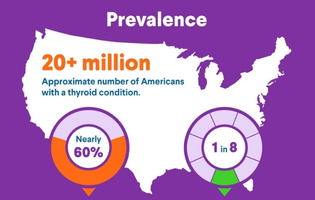Thyroid Eye Disease Treatment
Thyroid Eye Disease Treatment
How is thyroid eye disease treated?
If you have thyroid eye disease, your health care professional may recommend that you also see an ophthalmologist, a health care professional who specializes in eye and vision care. An ophthalmologist will be able to evaluate your symptoms and recommend a personalized treatment plan for you.
Although rare, thyroid eye disease can cause severe eye damage if left untreated. Treatment for thyroid eye disease generally occurs in two phases:
- Phase 1: Treat active eye disease using medications to preserve sight.
- Phase 2: Treat permanent changes. This may require surgery to correct double vision, reduce swelling, and eyelid retraction.
 Treatment Adjustment
Treatment Adjustment
Why does thyroid eye disease treatment need to be adjusted?
When you have treatment for thyroid eye disease, your health care professional monitors your treatment to check on how well it's working for you. Your health care professional also checks to see if your treatment requires adjustments, such as changes in the type or dosage of medication you are receiving.
For example, your health care professional may adjust your medication if it is:
- Not working as expected.
- Not relieving your symptoms well enough.
- Causing unpleasant side effects or worrisome complications.
- Interfering with another drug you take.
- Affecting another health condition you live with.
- Having a negative impact on your mental health.
If your initial drug therapy doesn't bring about the desired treatment results, your health care professional may prescribe stronger drugs or more invasive therapies, such as surgery.
In some cases, thyroid eye disease treatments can cause side effects and complications. For example, drops for dry eyes may cause irritation, redness, swelling, or increased sensitivity to light. Corticosteroids can cause weight gain, mood changes, fluid retention, or blood pressure changes. Other drugs that treat thyroid eye disease can cause headache, increased blood sugar, muscle spasms, or worsening of inflammatory bowel disease.
If you're experiencing any side effects or complications, tell your health care professional right away.
 Support
Support
Thyroid eye disease support
Living with any kind of health condition can affect your mental health. In the case of thyroid eye disease, changes to your appearance, such as bulging eyes, may affect your self-confidence. And changes in your vision may cause stress or anxiety as you worry about your ability to see.
Additionally, some types of thyroid eye disease medication can cause irritability, moodiness, insomnia, or other mental health concerns. What's more, if you have an overactive or underactive thyroid, medications to regulate your thyroid hormone levels may also impact your mood, especially as your health care professional works with you to find the just-right dose for you.
If you're experiencing feelings of anxiety, depression, irritability, or any other mood changes, don't suffer in silence. These could be a sign that your medication needs adjusting or that you could benefit from an evaluation by a psychologist or therapist. Your health care professional wants to know if your condition or treatment is affecting your emotional health, so if you're not feeling like yourself, speak up.
There's no shame in asking for help if you're struggling with the emotions that arise with the diagnosis and treatment of a serious health condition such as thyroid eye disease. Sometimes, just a few sessions with a licensed psychological care provider can help. Medication may also improve your outlook and your quality of life.
Some other strategies that may help include seeking social support from friends and family, joining online or in-person support groups, or talking with others who live with thyroid eye disease.
For mental health resources in your area, ask your endocrinologist or primary care provider, or use the American Psychological Association's psychologist locator. And to learn more about mental health, including warning signs to watch for, visit MentalHealth.gov.





 DOWNLOAD
DOWNLOAD




